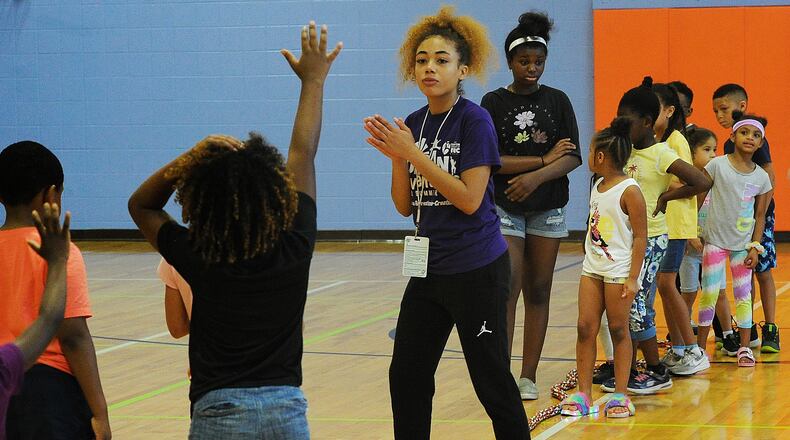The Kettering Parks, Recreation and Cultural Arts Department restricted its camps to Kettering residents, said Mary Beth O’Dell, the department’s director. She said the national labor shortage significantly impacted seasonal hiring.
“We chose to focus our most popular camps solely on Kettering residents so that we could serve as many families in the city as possible with our limited resources,” O’Dell said.
The number of Kettering campers climbed from 1,913 in 2021 to 2,549 in 2022, a 33% increase.
Mary Azbill, a city of Kettering spokesman, said last year the city’s Parks, Recreation and Cultural Arts Department chose to shorten the camps because many schools had a longer academic year. But she said there was also a hiring challenge for the camp leaders and aquatic staffing, so the department chose to run smaller camps to match staffing.
Parent Rianon Kuhnwald, whose 6-year-old participated in one of Kettering Rec’s summer camps, said she signed her child up in March or April. She said it was pretty easy to get him into summer camp, but this is the first year she signed him up.
Dayton Parks and Recreation had to cut camp offerings at Lohrey Recreation Center in Belmont last year due to low numbers of signups. Stephan Marcellus, division manager of recreation, said the camps are back to both the Lohrey location and the Northwest Recreation Center.
Marcellus said the department initially had a hard time recruiting people to work at the summer camps. But once they raised the wage from $13 per hour to $15 per hour, which was competitive with other summer camps, they were able to fill out the staff. In 2021, the city paid camp counselors $11.50 per hour, Marcellus said.
“We knew we had to raise our pay rate as well to be competitive,” he said.
Competitive pay is also a factor for staffing levels at the Beavercreek Parks and Rec Department, which hosts one eight-week camp and several sports camps each summer.
For summer camp counselors, the pay scale starts at $11.20 per hour and can rise to $14. Pay for camp directors ranges from $12 to $16 per hour.
“I think people are looking for more money. They can go to Chik-fil-A or Target to work for $15 to $20 an hour and that’s not something we can (offer),” said Parks and Rec Superintendent Kim Farrell.
Farrell said the traditional summer day camp is full, and the department is seeking to hire at least one additional counselor.
“One more counselor would put us exactly where we want to be, but we have a waitlist for each of our weeks of camp, so if we hired additional (counselors), we would be able to open more space,” she said.
COVID-19 is still a problem for the Dayton Parks and Rec summer camps, as well as for Glen Helen, which is offering overnight summer camps for the first time since 2019. Marcellus said staff has been reassuring parents their kids are in a safe place.
Marcellus said some slots are still available for Dayton’s summer camps later in June and through July. Slots are open to everyone, and scholarships are available.
Glen Helen executive director Nick Boutis said the Glen has been able to welcome some school groups back into the dorms in April and May, which helped the staff get a feel for what that is like after two years of not being able to offer overnight camps.
Boutis said day camps operated under heavy restrictions last year, with just nine kids and one counselor in each and everyone wearing masks. Some of those restrictions have been lifted, but Boutis said the Glen is still taking COVID-19 seriously.
Boutis said the camps have been outfitted with air filtration and purification systems expected to help decrease COVID-19 transmission in the dorms.
Staffing woes were an issue at the Glen too, he said. While they were able to hire enough staff, Boutis said more campers could have been served if staffing were not such an issue.
“If it had been easier for us to secure our summer team, we would have been able to serve more kids,” he said.
Boutis said there’s still a high demand for summer camp. He said he was late signing up his 10-year-old daughter for Glen Helen’s camp, and she’s on the waiting list.
“There is an increased recognition of the value of creating authentic social engagement experiences for kids and especially those that are kind of outdoors and tactile and experiential,” Boutis said.
The YWCA Dayton is one of the few places that had not seen staff shortages, said spokeswoman Kaitlin Schroeder.
“We are fully staffed and have also secured several volunteers to assist our staff in preparing for, and implementing, camp this year,” she said. “This has been our experience in past years as well, for which we are very grateful.”
The YMCA of Greater Dayton is enrolling fewer children into summer camp classes both because of the labor shortage and COVID-19.
The YMCA also typically enforces a lower ratio of kids to staff during the summer, according to Vickie Dannals, childcare services branch executive for YMCA of Greater Dayton.
“It’s all of the above,” Dannals said. “Basically, we’re trying to have adequate staff to cover everything we’re trying to do while having lower ratios to keep kids safe.”
Dannals said the organization normally hosts about 1,000 children each summer within day camps, but will host about 750 this summer.
With summer camps filling up quickly across the region, many parents are left feeling frustrated about a lack of options for their children.
“I would tell parents to stay positive and keep being persistent because sometimes a child will be signed up for a spot then their situation changes, so it doesn’t hurt to call and check (for an opening),” Dannals said.


